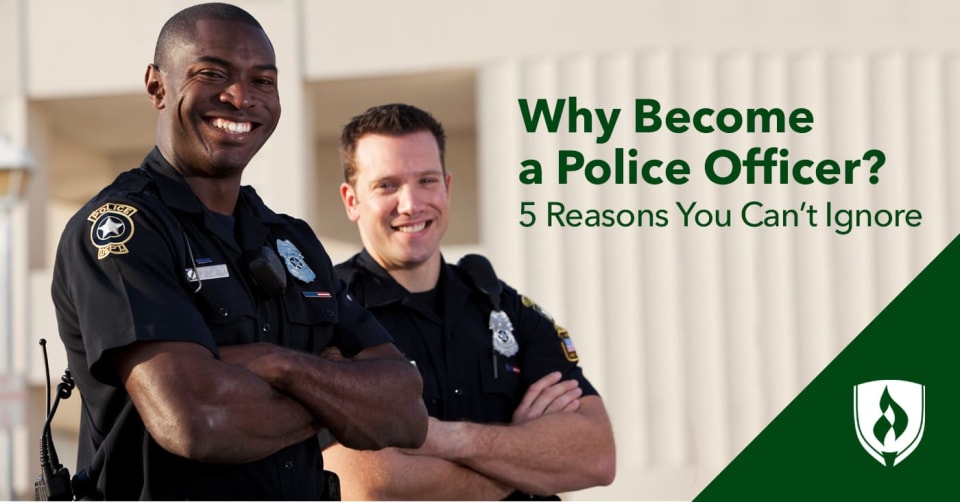
Are you ready for a career that’s more than just a job? Do you want to work in a profession that utilizes your mental and physical skills to positively impact the lives of others in your community? Do you feel called to help drive the positive change society is craving?
If you’re looking to dedicate your professional life to something challenging that you can be proud of, then a career in law enforcement might be a perfect fit. But working as a police officer can be demanding, and often a good day’s work can go unnoticed.
So, why become a police officer? While there aren’t necessarily “perks” of being a law enforcement officer, there are definitely compelling reasons to consider this rewarding career.
5 Reasons to consider being a police officer
We investigated the data and interviewed a seasoned law enforcement veteran to compile some of the most compelling benefits of being a police officer. Take a look at what we uncovered.
1. You desire to make a meaningful impact
Few careers are as rewarding as law enforcement. Police officers spend their days protecting and serving their local communities—not stuck in a desk chair in a cubicle. They’re often motivated by working for something greater than themselves, and they can end each day knowing their time and talents are being well spent. If you're passionate about helping build a positive police culture in your community, you could make a direct impact.
Mike Ardolf, Law Enforcement Program Coordinator at Rasmussen University and retired special agent for the Minnesota Bureau of Criminal Apprehension, says his motivation for starting a law enforcement career comes from a basis in service.
“I wanted to work in a profession that had interaction with the community and provides a sense of security when needed,” Ardolf says.
While paper-pushing jobs in which the primary concern is supporting your boss’ bottom line are a dime-a-dozen, your hard work can have a tangible impact on the community you’re working with as a police officer.
2. You seek a job that will make you proud
You’d be hard pressed to find a group of individuals more proud than the friends and family members of law enforcement professionals. It’s also true that the officers themselves form a bond you won’t find in many other professions.
These individuals stand by one another in good times and bad; achievements are celebrated and tragedies are mourned across the entire network. “Police officers have a kinship bond that is formed by providing safety and support for each other throughout their law enforcement careers,” Ardolf explains.
Police officers have also earned the respect and appreciation of those in their community by taking an oath to serve and protect the civilians in their jurisdiction. It’s true there are some who are resentful of law enforcement, but most people recognize the sacrifice and dedication officers put forth on a daily basis. The job satisfaction you can find in an active law enforcement role like this one is a big reason to become a police officer.
3. You appreciate variety on the job
Does the thought of sitting behind a desk all day make you cringe? If so, a career in law enforcement might be right up your alley.
No two days are the same for a police officer, thanks to a wide variety of job duties and the possibility that anything could happen on your shift. An officer’s day can include arresting suspects, issuing citations, responding to emergency calls, patrolling their assigned area, testifying in court and just about everything in between.
As you move forward in your career and gain experience, you may want to consider other job titles that police officers can hold like detective, air marshal, or special jurisdiction police office. Not only will you find variety in your day-to-day as a police officer, you can create new opportunities for yourself throughout your career.
4. You want to protect people, proactively
Many police officers come to the profession because they feel a strong instinct to protect people. But unlike TV dramas would have you believe, that's less often about catching a serial killer--and more often about enforcing safer driving, de-escalating dangerous situations and being a preventative presence or mediator.
If you want to help people and increase safety in a community, working in law enforcement as a careful, responsive and kind officer can be an amazing way to make that impact. Police officers have the opportunity to build trust with local neighborhoods and businesses. When people know they can trust the police in their area, they are more likely to call when they need help.
5. You’re interested in a potential early retirement
Thanks to the excellent pensions and retirement packages offered by most precincts, many officers have the opportunity to enjoy early retirement. While it’s not guaranteed in every situation, certain agencies offer police officers full retirement packages after just 20–25 years on the force, according to the International Association of Chiefs of Police.2
This early retirement option provides an opportunity for further education or even a second career. Some agencies even offer tuition assistance, meaning officers could be working toward a degree in a new field while still policing full time. Early retirement options also give officers a chance to spend more time with their families or doing other things they enjoy after devoting years of honored service to their communities.
Why do you want to be a police officer?
A career in law enforcement is a great opportunity to make an impact in your community while earning plenty of benefits along the way. So why become a police officer? The reasons above are just a few of the answers to the question.
If you're intrigued by the profession and curious about what it takes to pursue it, check out our article, "How to Become a Police Officer: Your Step-by-Step Guide."
If you’re already committed to making a difference in this career, visit our Law Enforcement Degree page to learn how we can help you take the next step toward becoming a police officer in Minnesota.
Related Articles:
- 9 Police Officer Skills You Already Possess as a Parent
- Police Training: A Deeper Look at Tactics, Weapons and Human Relations
1Bureau of Labor Statistics, U.S. Department of Labor, Occupational Outlook Handbook, [accessed March, 2020] www.bls.gov/ooh/. Information represents national, averaged data for the occupations listed and includes workers at all levels of education and experience. This data does not represent starting salaries. Employment conditions in your area may vary.
2Discover Policing, International Association of Chiefs of Police, About Policing: Financial Stability and Benefits, [accessed April, 2020] https://www.discoverpolicing.org/about-policing/financial-stability-and-benefits/
The Law Enforcement programs at Rasmussen University are not aligned to the standards of any professional licensing body other than the MN POST and are not intended to satisfy professional licensure requirements of any professional licensing agency in any other state.
EDITOR’S NOTE: This article was originally published in May 2015. It has since been updated in include information relevant to 2020.




